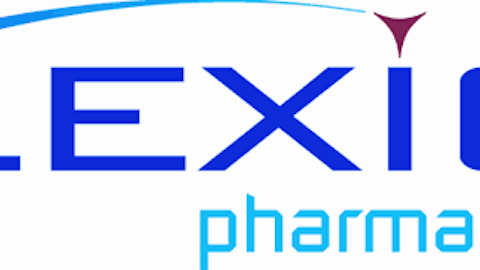Despite trading at 68.5 times its earnings, it is still undervalued in relation to the industry. I’d recommend buying this stock for its compelling long-term outlook.
The real strength of this company relies on its only marketed drug, Soliris, a highly effective, specific and innovative composite that has become quite popular in the U.S. and E.U,. and for which patients are willing to pay a considerable price premium. Soliris is actually one of the priciest drugs in the world, costing roughly $410,000 per year per patient. This has provided Alexion Pharmaceuticals, Inc. (NASDAQ:ALXN) with good operating and net margins, of 36.7% and 23.7% respectively, versus the industry’s respective 25.9% and 13.75% averages.
Expansion of Soliris sales may come from various sources. In the first place, its label expansion from the Paroxysmal nocturnal hemoglobinuria (PNH) indication into the Atypical Hemolytic-uremic syndrome (aHUS) enhanced the drug´s sales in the U.S. without the need of significant workforce increases, and will most likely see similar results when launched in the E.U. before the end of 2013. Approval of this label is pending in Japan; if obtained, this market could drive growth even further. As stated by the company´s Executive VP David Hallal in last quarter’s earnings call, as the aHUS launch progresses, four drivers will contribute to long-term growth.
First, an increasing number of patients with PMA will be tested for aHUS. Second, a shorter turnaround time for a higher proportion of ADAMTS13 tests. Third, once diagnosed with aHUS, a higher proportion of patients will be rapidly started on Soliris treatment. And finally, over time, physicians will more fully appreciate the genetic and lifelong nature of aHUS.
Already marketed for PNH in 40 countries, Soliris’ expansion has not yet reached its limit. Plans include penetration in Latin America and Korea before the end of 2014. “Analysts project Soliris sales may increase to as much as $2.6 billion from $1.5 billion as its label expands and more countries approve reimbursement” (seekingalpha.com).
In addition, several other uses for the drug are being tested. It could be utilized to treat both rare and common conditions, from inflammation associated with chronic disorders like hematology, nephrology, transplant rejection, neurology, and ophthalmology; to acute humoral rejection, myasthenia gravis and STEC-HUS–marketing approval for this last condition will be pursued soon in the U.S. and E.U. As many of these disorders cannot be currently treated effectively by any drug, Solaris’ approval could considerably boost the firm’s market share and revenue.
Incyte Genomics: A small company with room to grow
Incyte Corporation (NASDAQ:INCY) is a company that doesn’t look very good on paper, but is actually a buy. It has been posting net losses for 10 years and, consequently, paying no dividends. However, earnings have been improving over the last year, reaching $0.14 per share in 2012’s Q4. Last quarter saw a $0.12 per share loss, which meant a 66% growth year over year on the back of a 96% increase in revenue to $71.007 million. This exponential growth in revenue was mainly driven by Jakafi product sales, which rose 150% to $48.3 million. In addition, a deal with Novartis provided royalties for this product for the first time, adding $5.9 million in profits. The company expects sales of Jakafi to reach $210 to $225 million by the end of fiscal 2013, almost double the $136 million achieved in 2012.



